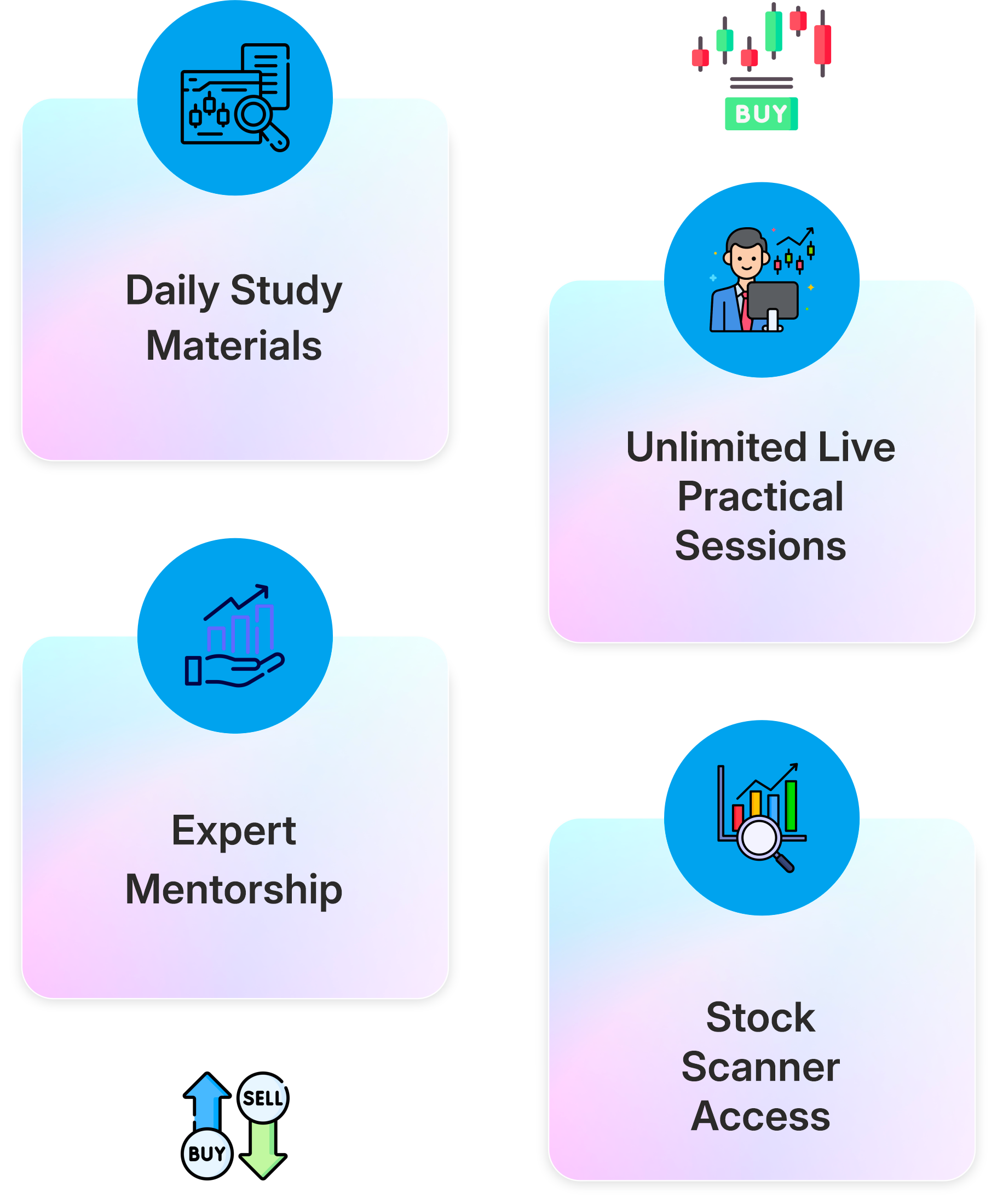



Top Stock Market Classes in Pune
Learn from Experts. Start Your Trading Journey Today!
Proven
Strategies
Algo Trading
and Demo

ChatGPT & AI Tools
for
Stock Selection

Unlimited Practical
Sessions
Why Sign Up For Finearn Online Share Market Classes
Module - 1 : Share Market Foundation
- Stock Market Basics (NSE/BSE History)
- Indian Retail Investors & Market Growth
- Leveraging Opportunities in Markets
- Personal Finance & Goal Execution
- IPO Basics & Listing Process
- IPO Analysis & Selection Strategies
- Primary vs Secondary Markets
- Intraday (Daily Trading)
- Delivery (Long-Term Portfolio)
- Swing (Trend-Based Trading)
- Equity Market Rules
- Taxation, Penalties, Auctions
- NSDL/CDSL Roles
- Trading Terminologies
- Own Trading Styles
- NISM/NCFM Certifications & Careers
Module - 2 : Futures & Options (F&O)
- Futures Market
- Rules & Regulations
- Trading Stocks / Indices
- Equity VS Futures Comparison
- Margins, MTM, Risk-Reward Ratios
- Commodity Market (MCX)
- Scope & Key Benefits of Commodities
- Bullion, Metals, Energy Trading
- Lot Sizes & Trading Timings
- Market-Affecting Factors
- Options Market
- Call / Put Options
- Hedging (Non-Directional)
- Speculation (Directional)
- Option Chain Analysis
- Strike Price, Premium, Greeks
- Open Interest (OI), PCR
Module - 3 : Fundamental Analysis
- Financial Statements
- Key Ratios (P/E, ROE, Debt-Equity)
- Company Valuation Methods
- Corporate Actions
- Dividends, Bonus, Buybacks
- Economic Indicators & Impact
- Qualitative Analysis
- Stock Selection & Case Studies
- Finearn Ten Vector Points (Investment View)
Module - 4 : Mutual Funds & Portfolio Mgmt.
- What are Mutual Funds?
- Process & Structure of Mutual Funds
- Types & Categories of Mutual Funds
- Investment Methods
- SIP, SWP, STP, Lump Sum
- ELSS, NFO, ETF
- Mutual Fund Selection Strategies
- Age & Risk-Based Investing
- Portfolio Monitoring & Rebalancing
- Risk-Reward Assessment
- Finearn Smart Strategies
- Asset Allocation & Diversification
- Age/Income & Risk-Based Diversification
- Power of Compounding
Module - 5 : Technical Analysis & Research
- Basics of Technical Analysis
- Chart Reading Fundamentals
- Price Action Trading
- Trend Lines & Types
- Support / Resistance Analysis
- Chart & Candlestick Patterns
- Technical Indicators (Below)
- Lagging (e.g., Moving Averages)
- Leading (e.g., RSI)
- Trading Strategy Development
- Advanced TA Tools
Module - 6 : Strategy & Trading Psychology
- Trading Strategies
- Intraday, Swing, Delivery
- Options: Straddle, Strangle, Covered Calls
- Backtesting & Proprietary (Finearn) Techniques
- Emotional Control & Behavioral Finance
- Overcoming Biases
- Trading Journal & Mistake Analysis
- Risk-Reward & Stop Loss Importance
- Position Sizing
Module-7: Algo Trading & AI Stock Analysis
- Introduction to Algorithmic Trading
- Benefits & Limitations of Algo Trading
- How Algo Trading Works
- Key Markets for Algo Trading
- Strategy Automation
- Wealth-Building Algo Strategies
- AI Tools for Trading
- Designing AI Prompts
- AI-Powered Stock Analysis
Module - 8 : Live Market Practical's
- Trading Platform Hands-On
- Real-Time Order Execution
- Live Stock Screening
- Financial Health & Chart Analysis
- Live Doubt Sessions (1:1)
- Trading Do's & Don'ts
- Group Discussions & Q & A

Batch Timing
EVENING BATCH : 7 PM - 9:30 PM
( Live Practical Session Unlimited)
Duration
3 Weeks / 2 Hours Daily
Modules
Number of
Modules - 08
Practical's
Unlimited Pactical Session
Flexible Batch
Online & Offline Courses
Finearn Share Market Classes Basic To Advance Single Masterclass Syllabus
Join the Finearn Share Market Courses in Pune for a compre-hensive 8-module Masterclass! From basics to advanced strategies, you will gain the confidence to succeed in the share market.
Enroll in our share market classes near me with fees that fit your budget!
Learn from experts and gain the skills to succeed in trading. Secrets of successful trading with our 8-module online share market classes. Whether you're a beginner or an experienced trader, our share market online classes offer in-depth lessons on everything from technical analysis to live market strategies.
Foundation of Stock Market
Indian Capital Market Structure
Fundamental Analysis & Research
Mutual Funds & Portfouo Management
Technical Analysis & Research
Strategic Live Analytics
Trading Psychology
& Risk Manage
Practical Session on Live Market
Finearn with Best Share Market Courses In Pune Offering Free Services
Learn Share trading easily and efficiently with Finearn Share Market Classes!
Our complimentary resources ensure that you maximize your course experience by
applying the teachings in real life. If you encounter difficulties or have questions,
our expert mentors are available to offer support whenever you need it.
Enjoy resources and study materials to learn at your pace.
Finearn Share Market Academy, powered by FINEARN Stock Market Institute,
offers expert-led trading education for aspiring investors.

We Are No.1 Masterclass Share Market Academy
India’s Trusted Stock Market Institute
Unlimited Practical
Session
Get hands-on market experience with no limit on practice sessions to build real trading skills.
AI-Based Stock Selection
Learn how artificial intelligence is used to choose the right stocks based on smart data analysis.
Algo Trading Introduction
Understand the basics of automated trading and how algorithms can make trading faster and smarter.
Online & Offline Course Access
Learn at your convenience with both online sessions and offline classroom options.
Proven Strategies with Live Execution
Master tried-and-tested trading strategies and see them applied live in the real market.
Session-Wise Study Material
Access organized learning content tailored for each session to enhance step-by-step learning.
Trusted by 9000+ Learners
Join a large community of successful students who have benefited from this program.
Regular Updates & Market Exposure
Stay updated with the latest market trends and get real-time exposure to live trading environments.
Why Choose Finearn Share Market
Classes In Pune
Discover a smarter way to learn – and earn.
Join Finearn’s share market classes in Pune and pave your path to financial independence and lasting success.
Our Industry Expert Trainer
Why Finearn Share Market Classes is Pune's Best Choice?


FAQ's
You can enroll in our stock market classes, both online and offline, by paying a simple Rs 1000 enrollment fee and attending one session. If you find it unsuitable for any reason, we offer a full refund without any questions asked.
The fee for classroom classes is Rs 10,000, and for online classes, it is Rs 8,000. Discounts and special offers may apply under certain conditions.
We are the oldest share market institute in Pune and we have highly qualified trainers who are stock market experts. We teach copyrighted strategies to help you succeed in the market.
You can enroll in our stock market classes, both online and offline, by paying a simple Rs 1000 enrollment fee and attending one session. If you find it unsuitable for any reason, we offer a full refund without any questions asked.
The fee for classroom classes is Rs 10,000, and for online classes, it is Rs 8,000. Discounts and special offers may apply under certain conditions.
We are the oldest share market institute in Pune and we have highly qualified trainers who are stock market experts. We teach copyrighted strategies to help you succeed in the market.
Both online and offline classes will include 5-day funda-mental, 5-day technical, and 5-day strategy sessions. Following this, practical sessions will be unlimited until you gain a comprehensive understanding.
The Basic to Advance Single Masterclass includes advanced content, eliminating the need for additional advanced classes.
No. Upon completing the stock market course with us, you will receive complimentary trading tools and advisory services.
We offer stock market classes from basic to advanced, conducted in a mix of Hindi and English.
Anyone with an interest in the share market, eager to learn, earn, and succeed, is welcome to join.
We offer lifetime support to those who complete the basic to advanced course.
No prior knowledge of the stock market is necessary, though any existing knowledge would be beneficial.
You can use any device, such as a mobile phone, laptop, or tablet, for both the course and trading purposes.
We offer a variety of learning formats to suit your needs, including offline classroom classes, online share market classes learning modules, and recording share market classes.
Yes. upon successful completion of our stock market courses, you will receive a certificate of completion from Finearn Stock Market Institute.
We accept various payment options for your convenience, including and bank transfers, gpy, phone pay We offer installment plans for our courses. Please get in touch with our admissions advisor for details.
For classroom sessions, we offer recordings or alternative arrangements to ensure you don't miss out on the material. For online courses, you can revisit modules at your convenience.
No prior experience is needed. Our stock market class is beginner-friendly and starts with the basics. Whether you're a student, working professional, or homemaker, you'll be guided step-by-step to understand market concepts and trading
techniques.
Finearn Stock Market Trading Institute In Pune
Deccan
Get In Touch
Office No. 12/16 3rd Floor, Status Chambers, Near Ramee Grand Hotel, Hotel Vaishali Lane, Deccan Gymkhana, Pune-411004.
Request A Call Back
Start Your Journey to Mastering the Stock Market







